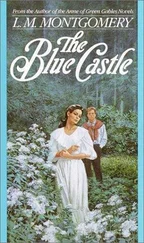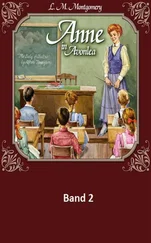"Did any one see it?" asked Marigold, round-eyed.
"No; but dey see de hoof-prints," said Lazarre conclusively. "And stomp in de groun' roun' de tree. An' you leesten now - where did Fidèle go if de devil didn't take heem? Nobody never see heem again roun' dese parts."
So no spruce wood for Marigold. In daylight she never really believed the devil had carried off Fidèle, but one is not so incredulous after the sun goes down. And Marigold did not really want to see the devil, though she thought to herself that it WOULD be int'resting.
She ran along the fence to the corner of the orchard where the spruces stopped. How cool and velvety the young grass felt. It FELT green. But in the Hidden Land it would be ever so much greener - "living green," as one of Salome's hymns said. She scrambled through a lucky hole in the fence, ran out into Mr. Donkin's wheat-stubble and looked eagerly - confidently for the Hidden Land.
For a moment she looked - tears welled up in her eyes - her lips trembled - she almost cried aloud in bitterness of soul.
THERE WAS NO HIDDEN LAND!
Nothing before her but fields and farmhouses and barns and groves - just the same as along the road to Harmony. Nothing of the wonderful secret land of her dreams. Marigold turned; she must rush home and find Mother and cry - cry - cry! But she stopped, gazing with a suddenly transfigured face at the sunset over Harmony Harbour.
She had never seen the whole harbour at one time before; and the sunset was a rare one even in that island of wonderful sunsets. Marigold plunged her eyes into those lakes of living gold and supernal crimson and heavenly apple-green - into those rose-coloured waters - those far-off purple seas - and felt as if she were drowning ecstatically in loveliness. Oh, THERE was the Hidden Land - there beyond those shining hills - beyond that great headland that cut the radiant sea at the harbours mouth - there in that dream city of towers and spires whose gates were of pearl. It was not lost to her. How foolish she had been to fancy it just over the hill. Of course it couldn't be there - so near home. But she knew where it was now. The horrible disappointment and the sense of bitter loss that was far worse than the disappointment, had all vanished in that moment of sheer ecstasy above the world. She KNEW.
It was growing dark. She could see the lights of Cloud of Spruce blooming out in the dusk below her. And the night was creeping out of the spruces at her. She looked once timidly in that direction - and there, just over a little bay of bracken at the edge of the wood, beckoning to her from a copse - a Little White Girl. Marigold waved back before she saw it was only a branch of wild, white plum- blossom, wind-shaken. She ran back to the orchard and down the steps to meet Mother at the door of Old Grandmother's room.
"Oh, Mother, it's so nice to come home at bedtime," she whispered, clutching the dear warm hand.
"Where have you been, child?" ask Young Grandmother rather sternly.
"Up on the hill."
"You must not go there alone at this time of night," said Young Grandmother.
Oh, but she had been there once. And she had seen the Hidden Land.
Then she had gone up the hill with Mother this spring - only a few weeks ago - to pick arbutus. They had had a lovely time and found a spring there, with ferns thick around its untrampled edges - a delicate dim thing, half shadow, all loveliness. Marigold had pulled the ferns aside and peeped into it - had seen her own face looking up at her. No, not her own face. The Little Girl who lived in the spring, of course, and came out on moonlit nights to dance around it. Marigold knew naught of Grecian myth or Anglo- Saxon folk-lore but the heart of childhood has its own lovely interpretation of nature in every age and clime, and Marigold was born knowing those things that are hidden forever from the wise and prudent and sceptical.
She and Mother had wandered along dear little paths over gnarled roots. They had found a beautiful smooth-trunked beech or two. They had walked on sheets of green moss velvety enough for the feet of queens. Later on, Mother told her, there would be June-bells and trilliums and wild orchids and lady's slippers there for the seeking. Later still, strawberries out in the clearings at the back.
"When I get big I'm coming here every day," said Marigold. She thought of the evening so long ago - a whole year - when she had seen for a moment the Little White Girl. It COULDN'T have been a plum- bough. Perhaps some day she would see her again.
Lucifer was prowling about the bed of striped ribbon-grass, giving occasional mysterious pounces into it. The Witch of Endor was making some dark magic of her own on the white gate-post. They were both older than Marigold, who felt therefore that they were uncannily aged. Lazarre had confided to her his belief that they would live as long as the Old Lady did. "Dey tells her everyt'ing - everyt'ing," Lazarre had said. "Haven' I seen dem, sittin' dare on her bed, wi' deir tail hangin' down, a-talkin' to her lak dey was Chreestian? An' every tam dat Weetch she catch a mouse, don' she go for carry it to de Old Lady to see? You take care what you do 'fore dose cats. I wouldn't lak to be de chap dat would hurt one of dem. What dem fellers don' know ain't wort' knowin'." Marigold loved them but held them in awe. Their unfailing progeny gave her more delight. Little furry creatures were always lying asleep on the sunwarm grasses or frisking in yard and orchard. Ebon balls of fluff. Though not all ebon, alas. The number of spotted and striped kittens around led Uncle Klon to have his serious doubts about the Witch's morals. But he had the decency to keep his doubts to himself, and Marigold liked the striped kittens best - undisturbed by any thought of bends sinister. Creatures with such sweet little faces could have no dealings with the devil she felt quiet sure, whatever their parents might be up to.
Lazarre had given over fiddling and was going home - his little cottage down in "the hollow," where he had a black-eyed wife and half a dozen black-eyed children. Marigold watched him crossing the field, carrying something tied up in a red hanky, whistling gaily, as he was always doing when not fiddling, his head and shoulders stooped because he was continually in such a hurry that they were always several inches in advance of his feet. Marigold was very fond of Lazarre, who had been choreman at Cloud of Spruce before she was born and so was part of the things that always had been and always would be. She liked the quick, cordial twinkle in his black eyes and the gleam of his white teeth in his brown face. He was very different from Phidime Gautier, the big blacksmith in the Hollow, of whom Marigold went in positive dread, with his fierce black moustaches you could hang your hat on. There was an unproved legend that he ate a baby every other day. But Lazarre wasn't like that. He was kind and gentle and gay.
She was sure Lazarre couldn't hurt anything. To be sure there was that horrible tale of his killing pigs. But Marigold never believed it. She knew Lazarre couldn't kill pigs - at least, not pigs he was acquainted with.
He could carve wonderful baskets out of plum-stones and make fairy horns out of birch-bark, and he always knew the right time of the moon to do anything. She loved to talk with him, though if Mother and the Grandmothers had known what they talked about sometimes they would have put a sharp and sudden stop to it. For Lazarre, who firmly believed in fairies and witches and "ghostises" of all kinds, lived therefore in a world of romance, and made Marigold's flesh creep deliciously with his yarns. She didn't believe them all, but you HAD to believe what had happened to Lazarre himself. He had seen his grandmother in the middle of the night standing by his bed when she was forty miles away. And next day word had come that the old lady had "gone daid."
Читать дальше


